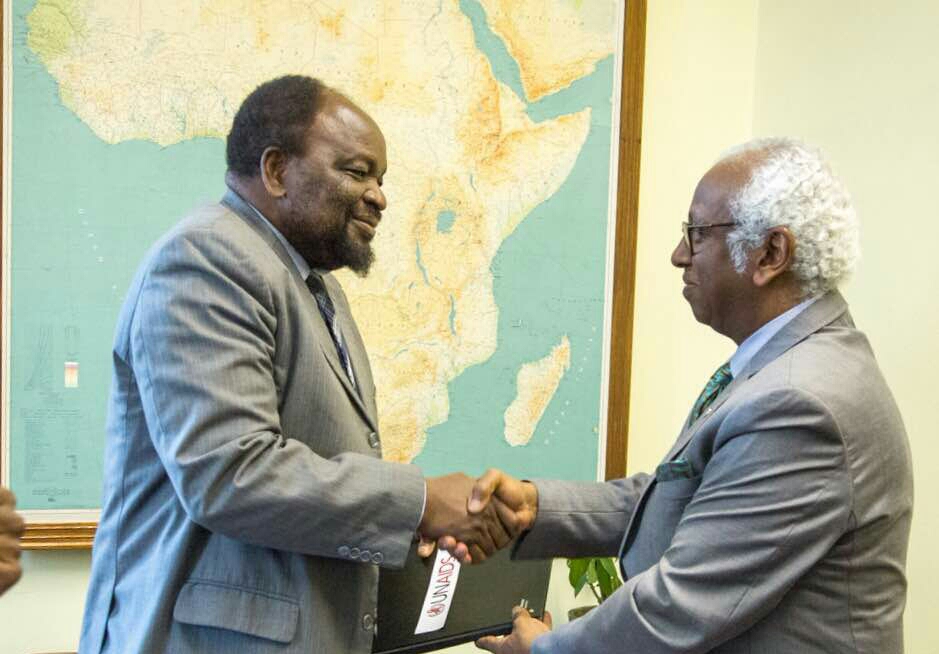By Byron Mutingwende
The Joint United Nations Programme on HIV/AIDS (UNAIDS) Zimbabwe has a new Country Director, Mr. Girmay Haile who brings a vast wealth of experience to the team.
Mr. Haile assumed office on 03 July 2017 and is a national of Eritrea. He was also elected to serve as the Dean of UNAIDS Country Directors in Eastern and Southern Africa effective April 2017.
The senior UN official presented his credentials to Simbarashe Mumbengegwi, the Minister of Foreign Affairs in Harare on 24 2017. Mr Haile served in the Government of Eritrea at different capacities in the areas of leadership capacity development, sector national planning, foreign policy, education, tourism, social welfare, research, social welfare and communications and pioneered several national development issues. He served as senior advisor in the Ministries of Education, Tourism and Social Welfare. He was member of the teams responsible for the establishment and leadership of the Ministries of Social Welfare and Labour, Education and as well as Tourism and Arts.
After he joined the UN in 1998 he served with UNICEF in Eritrea, Mozambique, and Malawi as a Planning, Communication and Monitoring Chief. Mr Haile joined the first batch of UN Reformers trained by the UN Staff College in Turin, Italy and has since been involved in a number of UN reform activities that included supporting UN missions in Botswana, Egypt, Eritrea, Ghana, Jordan, Kenya, Malawi, Mozambique, Namibia, Swaziland, Uganda, Ukraine, Zambia and Zimbabwe, to develop their UN Development Assistance Frameworks and UN Joint Teams and Programmes on HIV and AIDS.
Mr Haile joined UNAIDS in 2007 as M&E Adviser of the Kenya Office. He was later promoted to the post of Senior Institutional Development Adviser in 2009 in the same duty station. While serving in Kenya, he coordinated the landmark “Kenya Modes of Transmission Study” that heavily influenced policies in the national response and changed the tracking of the HIV epidemic from that of measuring only prevalence to measuring incidences. He also played a key role in the development of the 3rd Kenya National AIDS Strategic Plan which triggered the new generation of strategic plans around the world for HIV response.
Prior to his posting to Zimbabwe, Mr Girmay Haile served as the UNAIDS Country Director in Ghana since 2012. During his time in Ghana he mobilised high level political commitment to AIDS by the leaders of Ghana, organised an HIV awareness campaign (known as “Protect the Goal” campaign) to reach out to over 5 million Ghanaian youth to bring “practice safe sex” messages, was an instrumental advocate in the legislation of a new HIV Act and the establishment of an AIDS Fund, supported a successful tenure of the Ghana First Lady as the President of the OAFLA, championed youth and issues of young girls and supported Ghana Government serve as Vice Chair (2016) and Chair (2017) of the UNAIDS governing Board – the Programme Coordinating Board.
Mr. Haile enjoys a wide range of network and friendship among national and civic leaders, diplomats, artists, activists and development experts. He was instrumental in the setting up of a mediation process during the 2008 post-election crisis in Kenya and brokering secession of hostilities before the political mediation was taken over by Dr Kofi Annan. He has special interests in political affairs, economics, arts and African development. He is also a passionate supporter of youth development and is a strong Pan Africanist.
Mr. Haile has a Master’s Degree on International Relations and Strategic Studies from the University of Lancaster, UK and he is a single parent of two children.
At the country level, UNAIDS provides leadership, coordination, accountability framework, advocacy and generation of strategic information on the Joint UN Team on AIDS.
UNAIDS inspires the AIDS response of Zimbabwe to achieve its shared vision of zero new infections, zero discrimination and zero AIDS-related deaths. It also leads and unites the efforts of UN organisations and works closely with global and national partners towards ending the AIDS epidemic by 2030, as part of the Sustainable Development Goals.
Through this support and with other partners, the Government of Zimbabwe has made great progress in improving access to HIV prevention, testing and treatment services for the general population and key populations, and towards achievement of the 2020 ambitious 90-90-90 targets and towards the elimination of HIV/AIDS as a public health threat by 2030.
